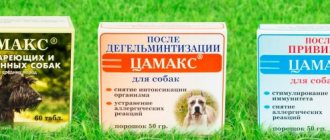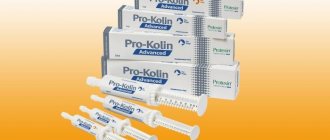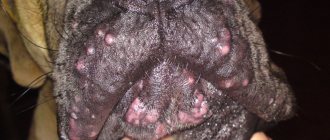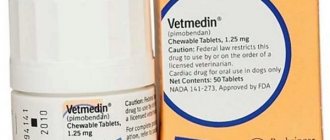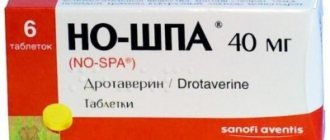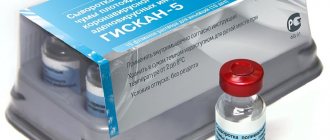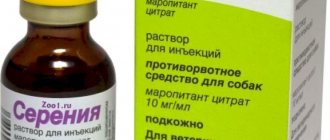The owner of his four-legged best friend is always happy when his dog is healthy. However, unfortunately, troubles also happen to pets. For example, they develop a pathological condition such as diarrhea.
At the same time, the dog may not eat well and often go out of his way to relieve himself. In this case, the dog’s stool becomes liquid and can often change color. However, this condition of a pet can be caused not only by infections. Diarrhea may be drug-induced.
Can a dog be given Bifidumbacterin?
Veterinarians allow Bifidumbacterin to be given to dogs for intestinal disorders. The drug does not contain chemicals. It consists entirely of living bacteria that are not capable of harming the animal. The probiotic can also be given to puppies and pregnant and lactating dogs.
The drug helps normalize stool in case of gastrointestinal disorders, but its therapeutic effectiveness is lower than that of zooprobiotics.
Dosage
Each package contains 7 pouches of 30 ml. Each pouch is a daily dose, which does not depend on the breed, weight and age of the dog. The course of administration depends on the purpose of use and is determined by the veterinarian.
It is better to give the supplement in the morning, before feeding. A noticeable result can be seen with daily use of the feed additive for two weeks. It is recommended to conduct such courses every three months. In addition, during the vaccination period, it is recommended to give Viyo drink for 2 weeks before vaccination and 2 weeks after it.
Composition and biological properties
The immunobiological preparation contains bifidobacterium bifidum Bifidobacterium bifidum. Each unit of probiotic contains at least 1107 CFU.
Bifidumbacterin for oral use is available in the following forms:
- capsules (in blisters);
- powder (in sachets);
- lyophilisate (in bottles).
Each unit of the drug (regardless of the release form) contains 5 doses.
Bifidobacteria suppress the growth and activity of a wide range of pathogenic microorganisms that live in the intestines: staphylococci, E. coli, Shigella, Proteus, yeast-like fungi, etc.
The use of Bifidumbacterin in dogs helps restore the protective functions of the intestines, normalize digestion, activate metabolic processes and improve immunity.
Drug-induced diarrhea
This most often occurs with long-term use of antibacterial drugs, which inevitably leads to the destruction, reduction or increase in the number of opportunistic microorganisms and saprophytes of the dog’s intestines. This condition is referred to as “dysbacteriosis”.
In this case, to provide medical care to the pet, it is necessary to give medications that normalize the microflora of the animal’s colon. One of these drugs that many people hear is the probiotic bifidumbacterin.
Indications for use in dogs
Bifidumbacterin can be used for adult dogs and puppies for the following indications:
- treatment and prevention of intestinal dysbiosis;
- allergic diseases;
- after therapy with antibiotics, hormones, NSAIDs;
- liver pathologies;
- chronic colitis;
- malabsorption syndrome;
- chronic constipation, diarrhea;
- intestinal infections.
As an additional therapy, Bifidumbacterin can be prescribed in the treatment of adenovirosis. In this case, the probiotic acts as an immunomodulator and replenishes beneficial microflora after taking antibiotics.
Reviews
Vasily, Ekaterinburg
“I noticed that my dog became lethargic, stopped running around the apartment and jumping on the sofa. A friend advised me to buy a probiotic. I chose FortiFlora from Purin. And after two weeks, Moska began asking for walks again.”
Veronica, Kaliningrad
“My Yorkshire terrier got poisoned after drinking water from a puddle. At first I saved him from infection with antibiotics. And then she restored the microflora with probiotics. The drug Akti-Dog helped us. Now I give it to my dog as a preventive measure.”
Directions for use and doses
Instructions for use of Bifiumbacterin for dogs:
- Adults and puppies weighing from 3 to 10 kg – 5 doses (1 capsule, contents of a sachet or bottle) per 1 dose.
- Animals weighing more than 10 kg - 10 doses (2 sachets).
The drug is given 20-30 minutes before meals or during feeding, mixed into food. The powder can also be diluted with a small amount of boiled water at room temperature.
For chronic pathologies in a dog, the dosage of Bifidumbacterin can be increased 2-3 times in agreement with the veterinarian.
The drug is given 2-4 times a day depending on the severity of the disease. For acute intestinal infections and after antibiotic therapy, the drug is used for 1-1.5 weeks. In chronic cases of the disease, the course can be increased to 1 month.
The dose of Bifidumbacterin for a small puppy is selected by a veterinarian individually depending on age and weight.
Can I use the drug?
The use of this drug is allowed by veterinarians, since it makes pets (including dogs) feel better.
Attention! The prescription and dosage calculation for each dog is made strictly individually and only by a veterinary doctor. If the health of the dog is important to the owner, then you should not self-medicate.
For diarrhea
Diarrhea is the main indication for the use of the described drug in dogs.
Other indications
This drug is prescribed by a veterinary doctor, as a rule, in the following cases:
- drug diarrhea;
- loss of appetite associated with long-term use of antibacterial agents;
- diarrhea and indigestion without clinical manifestations of general intoxication of the animal’s body.
Veterinary analogues
Bifidumbacterin is an alternative to veterinary probiotics designed specifically for dogs. Specialized drugs include:
- Lactobifadol forte;
- Lactobifid;
- Zoonorm;
- Vetom 3;
- Akti-Dog;
- Subtilis.
Lactobifadol forte is a feed additive that contains a mixture of live acidophilus and bifidobacteria.
The drug improves the digestive function of the gastrointestinal tract, increases local immunity and helps normalize stool in the animal. Additionally, the probiotic contains amino acids and B vitamins. Price – 150 rubles. per package 50 g.
Lactobifide is prescribed for diarrhea, constipation in dogs, flatulence, vomiting, and allergic reactions. Large animals are given 1 tablet for every 10 kg of body weight. Small animals and puppies up to 10 kg are prescribed 1 tablet. Cost – 100 rubles. for 20 tablets.
Zoonorm is used for the prevention and treatment of enteritis, viral gastroenteritis, salmonellosis, bacterial diarrhea and dysbacteriosis in dogs. A package of the drug (10 packets) costs 120 rubles.
Vetom 3 is a new generation probiotic used for intestinal infections and food poisoning. Unlike similar drugs, this immunobiological drug remains highly active when passing through the aggressive environment of the stomach. Available in 2 forms - powder and liquid. A package weighing 50 g costs an average of 150 rubles.
Akti-Dog is a probiotic preparation produced for puppies, small, medium and large breed dogs. One package contains 5 sachets. The cost of the probiotic is 115 rubles.
Subtilis is a biological product prescribed for diseases of the gastrointestinal tract accompanied by constipation and diarrhea. It contains beneficial microorganisms B. Subtilis and B. Licheniformis, which multiply quickly and suppress the growth and activity of pathogenic microflora. The price of a package is on average 450 rubles.
Side effects
There are no contraindications for probiotics, but an overdose or therapeutic dose of the drug sometimes causes side effects in dogs.
The most common reactions include constipation, diarrhea, and bloating. In this case, it is necessary to reduce the dose to a minimum, and then gradually increase it, monitoring the pet’s health.
Many dietary supplements contain other beneficial substances in addition to probiotics. The preparations are enriched with yeast, lactose, and prebiotic fibers. Some dogs have an allergic reaction to such components. If itching, redness, or hair loss occurs, you must stop taking it and change the medication.
Symptoms to watch out for
Many dog owners are interested in whether it is possible to give their dog chloramphenicol for diarrhea. To minimize the discomfort that torments your shaggy pet, it is worth taking your dog to the veterinarian. Prescribing anything to a puppy without consulting a specialist is risky.
When worrying about the well-being of your faithful watchman, do not forget that some canine ailments (worms, leptospirosis) are also dangerous for people. While the pet owner is asking friends which anti-diarrhea tablets are good for dogs, the animal may develop more serious ailments...
Here are the symptoms your pet may have that should prompt you to consult a veterinarian:
- Exhausting vomiting.
- Black color of stool. This sign indicates bleeding in the stomach.
- Streaks of blood in stool. This alarming sign also signals bleeding. But it happened in the large intestine.
- Green mucus in dog poop. Some infectious diseases manifest themselves as such symptoms.
- High temperature and fever.
- Rapid weight loss.
- The animal's reluctance to drink water.
- Aggression towards owners.
- Apathy, fainting state.
- Excessively pungent or putrid odor of dog feces.
Probiotic therapy
Dysbiosis in puppies and adults can be treated with human and veterinary probiotics. Among the most effective veterinary medications, doctors identify:
- Vetom 1.1;
- Fortiflora;
- Lactobifid;
- Lactoferon;
- Multibacterin Omega 10.
An alternative to veterinary medications are probiotics, which can be purchased at regular pharmacies:
- Linux;
- Bifiform;
- Bifidumbacterin;
- Bificol
- Probinorm;
- Baktisubtil;
- Lactoferon;
- Lactobifid.
The veterinarian determines which drug to prescribe after receiving the test results. The duration of therapy and dosage are also determined by the attending physician.
When are probiotics prescribed:
Probiotics for dogs are indicated as part of complex therapy in the treatment of various diseases. The doctor selects the drug based on the severity of the pathological process, the age and size of the pet. Probiotics for dogs of large breeds, small animals, and young animals are indicated in the following cases:
- treatment with antibiotics, antibacterial agents;
- use of chemotherapy drugs for oncological processes;
- food and non-food intoxication;
- stress;
- treatment of helminthic infestations;
- decreased immunity;
- acceleration of regeneration processes after surgery;
- changes in diet, feed;
- separation from the mother, early separation of puppies from the bitch;
- young animals on artificial feeding;
- inflammatory diseases of the gastrointestinal tract and liver;
- violation of the principles of healthy eating.
How often to give your dog probiotics depends on the animal's diagnosis. The duration of the course, frequency of administration, and the need for prophylactic use of drugs of this class will be determined by the attending physician.
What to give for diarrhea: universal treatment regimen
Diarrhea often occurs due to a common stomach upset: when changing food, introducing a new product into the natural diet or treats. Situations are not excluded when the dog simply picked up some nasty stuff on the street or took treats from the hands of compassionate passers-by.
In such situations, the owner can easily cope alone. Need to:
- Eliminate any food and treats. Puppies are not fed until 12 hours; adult dogs can easily withstand a hunger strike for 1-3 days. The exception is obese pets. In them, complete starvation disrupts liver function.
- Give your dog a sorbent for diarrhea. Enterosgel, Atoxil, activated carbon.
- Drink plenty of water. Frequent bowel movements lead to dehydration and disrupt electrolyte balance.
- Drink herbal decoctions. Blueberries will do; sage; St. John's wort; cinquefoil, oak bark, pomegranate peel. They strengthen, soothe the intestines, and reduce fermentation.
- Prepare rice or flaxseed broth. They have a fixative effect, envelop the walls of the stomach and intestines and, thereby, protect their mucous membrane.
But sometimes diarrhea is caused by chronic or acute pathologies. You cannot act independently when:
- there is blood in the stool: scarlet color indicates bleeding in the rectum, black indicates hemorrhage in the upper gastrointestinal tract (GIT);
- vomiting occurred;
- the temperature has risen or dropped;
- a depressed state is noted: the dog hides in a corner, whines, and does not allow itself to be petted;
- There was discharge from the eyes and nose.
If you notice one of these symptoms, contact your veterinarian immediately. A delay of even a couple of hours can result in the death of your pet. These signs indicate:
- intoxication with poisons;
- entry of a foreign object into the gastrointestinal tract;
- helminthic infestation;
- pathologies of the digestive system;
- acute infectious conditions - infection with distemper, rotavirus, parvovirus;
- cancer.
Also, veterinary intervention is necessary if you have not vaccinated your dog within the last year or you have a puppy under 6 months of age - dehydration and death quickly occur in kittens.
Regardless of the causes of diarrhea, you absolutely cannot:
- Use medications for people that slow down intestinal motility. They retain toxic substances inside the body, which increases intoxication.
- Use antibiotics. Yes, they help with diarrhea, especially if it is caused by a bacterial infection. But the prescription of antibacterial agents is the prerogative of the doctor. Only he will select a safe drug and dosage.
- Force feed. The food still won't be digested. But it will increase diarrhea, vomiting, intestinal fermentation, and gas formation.
- Feed with vegetable oils. Sunflower, olive, and flaxseed oils increase diarrhea.
After the condition improves, the animal is kept on a diet for a couple more days. On the first day they give empty rice, on the second - fermented milk products. From the third day, lean boiled meat, eggs, and sea fish are allowed. Only by the end of the 1st week do they return to their normal diet.
Features of receiving Linex
If the animal is mildly ill, a course of this drug during feeding is sufficient. But if your dog has constant vomiting, diarrhea, lack of appetite, signs of intoxication and dehydration, Linex will not help. First, you need to eliminate the cause of the disease by prescribing the correct treatment, which can only be determined by a veterinarian. It could be:
- a course of antibiotics for infectious or fungal infections of the animal;
- taking special medications to stop diarrhea, vomiting, and the development of intoxication (usually the same medications are prescribed as for humans, for example, metoclopramide).
- When the furry patient’s condition has stabilized, a diet is prescribed for the recovery period while taking probiotics, in particular Linex.
Is it possible to give Linex for vomiting in dogs?
Yes, it is possible, but as stated above, first you need to eliminate the vomiting itself, and give Linex only when the condition has stabilized. If vomiting continues, the capsules will simply come out through the mouth without having any effect. It turns out that efforts and financial costs will be wasted without a hint of improvement.
Dogs have natural and intoxicating vomiting. In the first case, the dog can eat grass on its own, after which it will vomit. This usually occurs when the animal experiences periodic minor deteriorations in its health. On an instinctive level, the pet tries to help itself by inducing vomiting.
People also do this if they suspect poisoning, taking large amounts of liquid with potassium permanganate or activated carbon. Natural vomiting occurs once and should not cause concern to the owner, since the dog will continue to lead an active lifestyle as if nothing had happened.
In the second case, when the urge to vomit is repeated, exhausting, accompanied by a sharp loss of weight, interest in life, chills, diarrhea, it is worth seeking help from a specialist who will determine the cause of the phenomenon and prescribe treatment. Intoxication vomiting is caused by major problems in the stomach, intestines, liver, and pancreas. Linex will only play a supporting role here as a supporting drug against the background of the prescribed treatment.
Summing up
Linex can be prescribed to dogs for any form of digestive system disorder. It definitely won't get any worse. In mild cases, it can be used as a preventive remedy for stomach problems. In severe complicated cases, taking Linex alone will not provide relief; its use must be accompanied by high-quality treatment of the underlying disease. If Linex does not help for several days, you need to consult a doctor for specialized help.
Linex helps dogs restore the balance of live bacteria in their intestines. From time to time, animals suffer from gastrointestinal disorders for various reasons: overeating, poisoning, etc. The drug is prescribed for the treatment or prevention of dysbiosis. The length of time you take the medicine will depend on the severity of the disease.
Prevention
The following preventive measures will help prevent relapses of dysbiosis:
- deworming 2 times a year;
- timely detection and treatment of gastrointestinal pathologies;
- taking a course of probiotics after antibiotic therapy;
- feeding with high-quality super premium or holistic food.
At the first signs of a disturbance in the functioning of the digestive organs, it is necessary to contact a veterinarian to identify the cause, and put the dog on a therapeutic diet.
